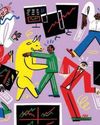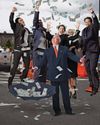CATEGORIES
فئات

LEADING FROM THE HEART TO MAKE A REAL DIFFERENCE
As COVID-19 vexes the world, SAP is helping its employees and customers lean into change

PRIDE IN PEOPLE POWER IN PERFORMANCE
FOR ADVANCED MANUFACTURING AND MACHINING GIANT PETERSEN INC. , PUTTING IDEAS INTO ACTION IS THE WAY TO SUCESS.

TOTAL ECLIPSE
RENEWABLE ENERGY IS KICKING COAL TO THE CURBEC

MADE IN AMERICA
Bringing manufacturing back from overseas sounds great, but it's not easy

HOW FAST IS WARP SPEED?
WHERE WE STAND ON AN EFFECTIVE COVID -19 VACCINE

GOING WITH the flow
Syntron Material Handling is on the move
With ridership down 90 percent, US ferries endure pandemic pause
Most U.S. ferry operators saw ridership declines of more than 90 percent during certain weeks of the COVID-19 pandemic, according to the Passenger Vessel Association. Going into the summer months, ferry systems from coast to coast are retaining as many crewmembers as they can while waiting for passengers to return.

Vinik answers call, clears hurdles with seasoned offshore fleet
Daunting is a good word to describe the process of getting some older tugboats into compliance with Subchapter M, said Capt. Mike Vinik, a 2003 SUNY Maritime graduate and owner of Vinik Marine, a New Jersey-based towing company founded in 2005. He then brought up the case of his largest current tugboat, Vinik No. 6, which is 50 years old.

Towing: Pandemic leads to remote inspections, extensions for Subchapter M
There were numerous obstacles during the decade-long period in which Subchapter M, the new regulatory framework for the towing industry, was created. Now, in the second year of the rollout, there is another challenge: COVID-19.

Strong outdraft ‘overwhelmed' pilot before tow hit dam, NTSB says
Mary Lucy Lane looked out of shape as its 12-barge tow neared Markland Locks and Dam on the Ohio River in Warsaw, Ky. A challenging crosscurrent from the dam sucked the downbound vessels farther out of position during their final approach.

Signals: Civilian mariners barred from leaving MSC ships during pandemic
While the world embraced social distancing and self-isolating amid the spread of the coronavirus, the Military Sealift Command (MSC) required thousands of civilian mariners, or “civmars,” to stay on U.S. Navy ships, sharing tight quarters and cramped workspaces.

Marine radio tech gets friendlier, more capable in cellular age
For more than a century, marine radio has been a boon to all who work on the water, providing first for improved safety and, over time, becoming an indispensable operational tool. In recent years, it may not have experienced the “mobile revolution” that smartphones have brought to life ashore, but it has acquired many new capabilities.

High court's safe-berth ruling favors shipowner over charterer
The U.S. Supreme Court has ruled that charterer Citgo is liable, not the shipowner, for the cost of cleaning up the 15-year-old Athos I oil spill in the Delaware River, deciding that the safe-berth clause in the charter contract should be interpreted as a safety warranty.

Explosion injures crewman, leaves boxship adrift in North Atlantic
One crewman was injured during a “severe” engine failure aboard a Danish containership that left the vessel adrift in the North Atlantic.

Correspondence: Pandemic shuffles deck, but marine exchange keeps San Pedro safe
Amid the COVID-19 crisis, all of the terminals in San Pedro, Calif., remain open, but ship traffic has decreased and the amount of cargo transiting both ports — Los Angeles and Long Beach — declined significantly through the first four months of the year. The anchorages in the San Pedro roadstead were full of cruise ships going nowhere, loaded car carriers with no place to offload, and tankers with full loads but no buyers.

Casualties: NTSB: Failure to heed storm warning doomed Stretch Duck 7
Stretch Duck 7 entered Table Rock Lake near Branson, Mo., on a warm summer evening with 31 people on board. Barely 10 minutes later, a powerful storm front passed, generating 70-mph winds and 3-foot waves on the previously flat lake.

Inside the Boys Club
A sexual misconduct scandal at Ubisoft, the hitmaker behind Assassin’s Creed, has disrupted its inner circle and incited calls for more drastic measures

NEW AND IMPROVED AND A REGULATORY GAMBLE
JUUL HAD A FAULTY PRODUCT IT WAS PROHIBITED FROM MAKING BETTER. IT DID IT ANYWAY. WILL THE WORLD’S BIGGEST E-CIGARETTE MAKER PAY A PRICE?

SUPERCARS ARE DROPPING LIKE SNEAKERS
With limited special releases, luxury automakers are increasing excitement and competition for their offerings—and raising margins.

Harley-Davidson Gets An Unlikely Rider
The motorcycle icon tapped a German environmentalist to stem its U.S. slide

I SCREAM, YOU SCREAM, WE ALL SCREAM FOR SOCIAL, ECONOMIC, AND ENVIRONMENTAL JUSTICE
Ben & Jerry’s recipe for corporate activism

CRACKUP IN WEST TEXAS
IF PRICES DON’T RECOVER BOTH DRAMATICALLY AND QUICKLY, THE ERA OF SHALE OIL MIGHT COME TO A SHUDDERING END
Breakthrough Technologies For Surviving a Hack
How a big manufacturer beat ransomware attackers without paying the ransom

Beware, Fiscal Cliff Ahead
Economists say at least $1 trillion is needed to sustain a recovery that is faltering

Investors Can't Stop Dancing
The bull is calling the tune, but prices are high and some pros are getting anxious about what will happen when the music stops

Awkward!
Banks profited from volatile stock and bond trading as the pandemic roiled the markets

Newly christened Centerline moves forward in post-Harley era
Towing

NTSB: Hull leaks reported but ‘not resolved' before towboat sinking
Tom Bussler was upbound on the Tennessee River when the captain noticed the bow riding low in the water. He steered toward the riverbank but didn’t get there before the 58-foot towboat sank.

Wind ships ahead: Technology pulling more power from sails
Correspondence

Shipping proposes $5 billion research program to cut CO2 output
Maritime shipping transports 90 percent of the goods traded globally and is responsible for about 2 percent of the world’s human-produced CO2 emissions, according to the International Maritime Organization. That percentage could rise to 20 percent by 2050 if no action is taken.